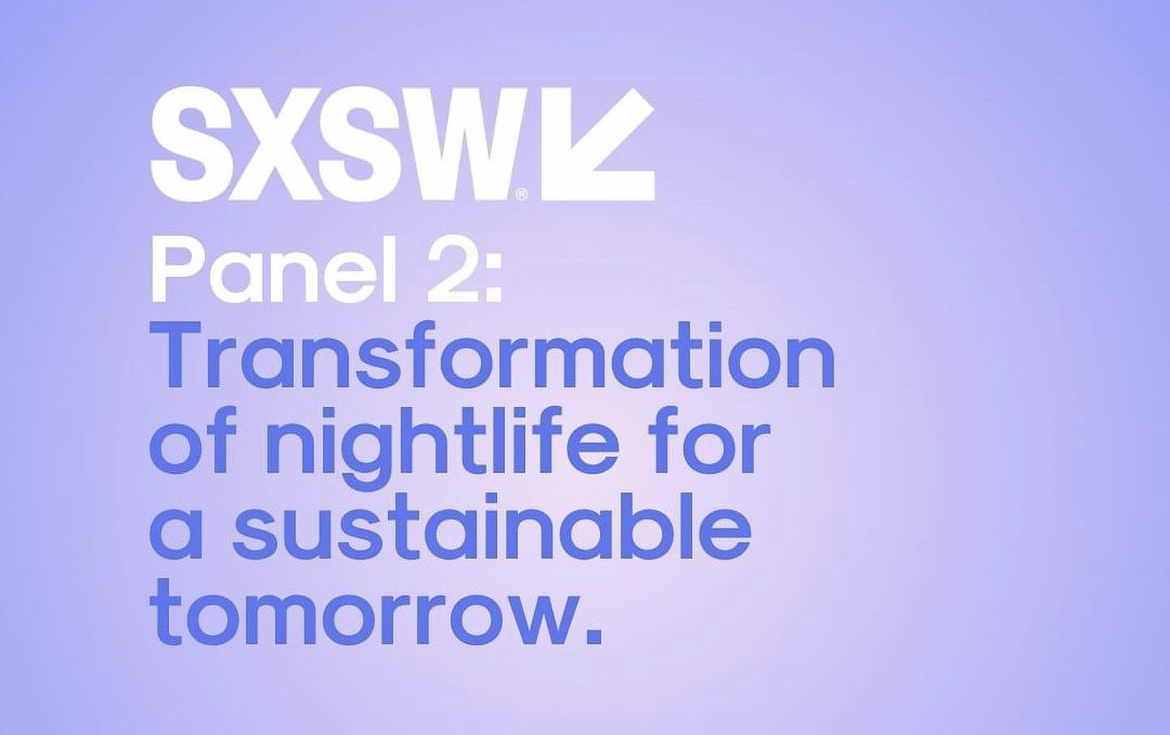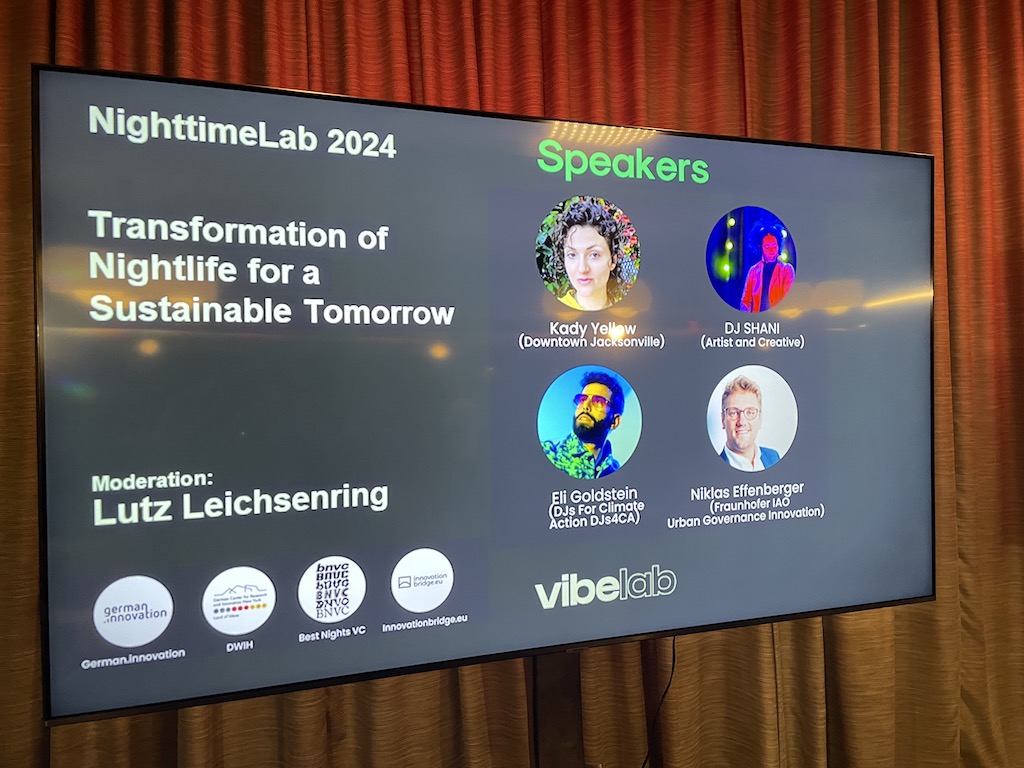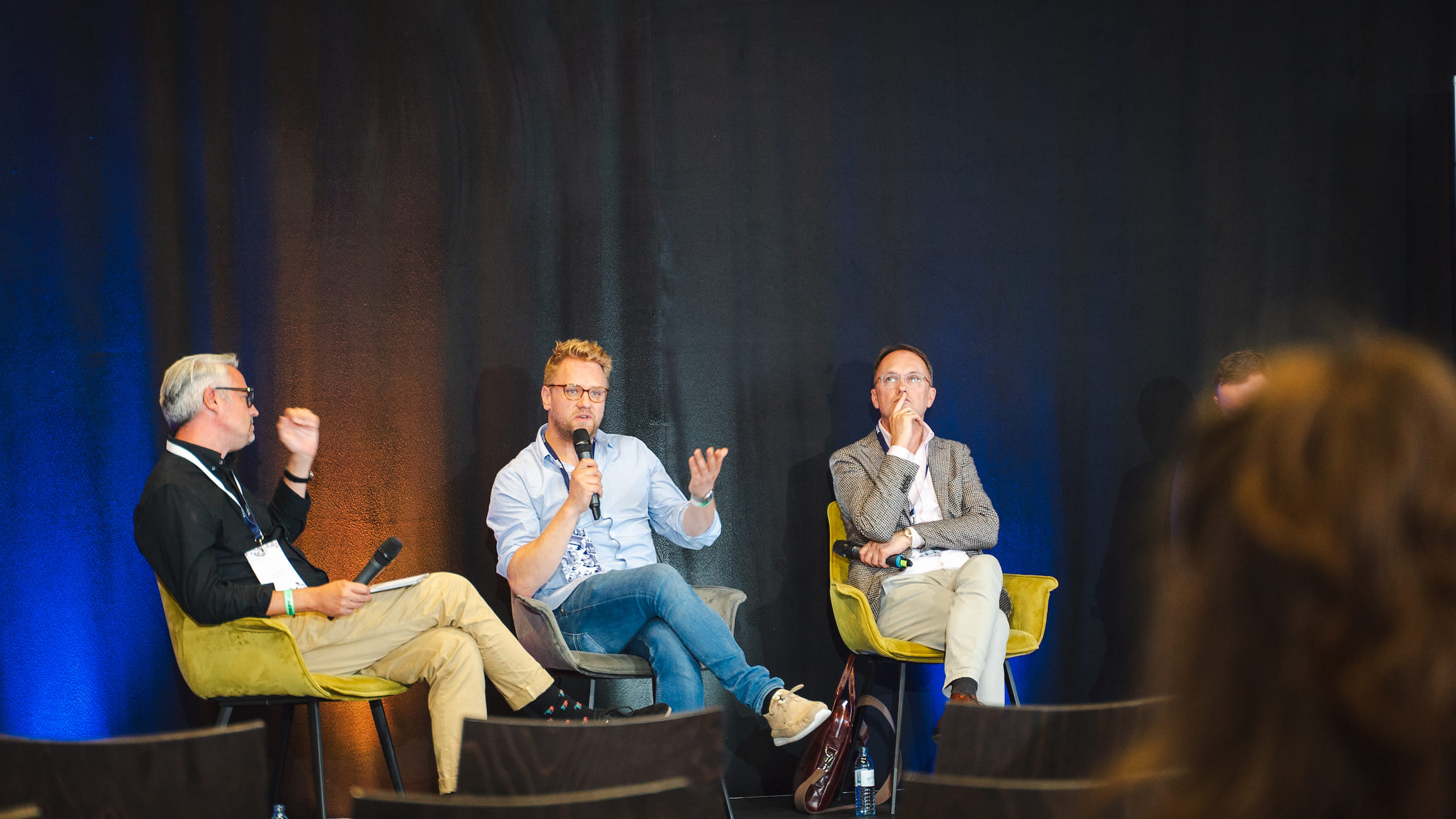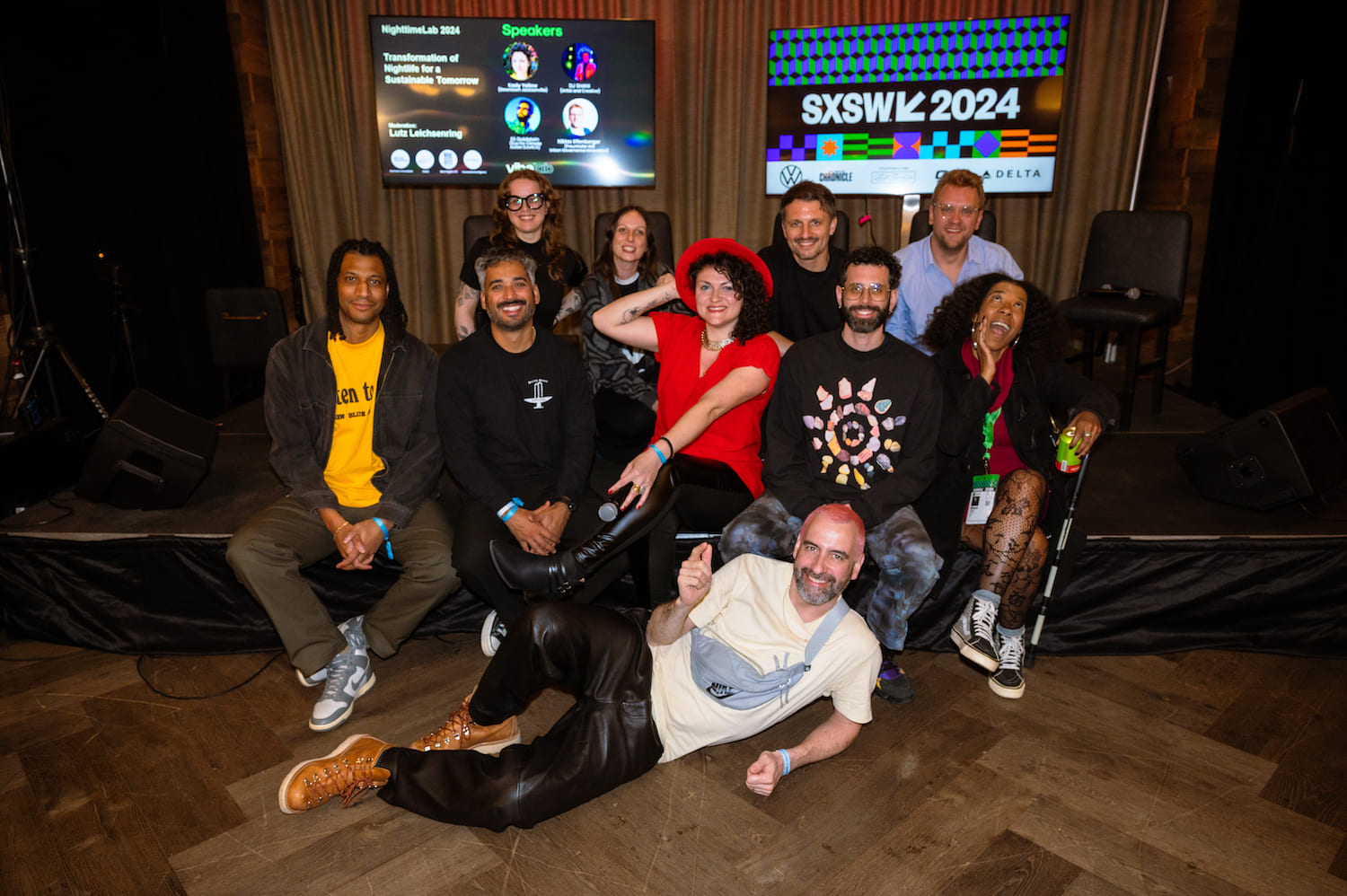
My personal Night-Shift: Finding Out about the Importance of a Topic
My personal Night-Shift: Finding Out about the Importance of a Topic
This year, I had the opportunity to participate in a panel discussion at the ‘South by Southwest Conference and Festival - SXSW’ titled “The Transformation of Nightlife for a Sustainable Tomorrow” - how exciting!1
But besides this exciting opportunity, besides the fact of being able to travel to Austin, to meeting interesting people and to talking on a panel; over the past years the topic grew closely to my heart.
I genuinely believe, that linking the environmental transition a lot of cities worldwide pursue, with culture and nightlife could benefit both worlds drastically. And guess what - I’m not alone!2
 Good panel, good Conference, good mood - let’s go :)!
Good panel, good Conference, good mood - let’s go :)!
But let’s go step by step - how did this all start?
Back in the days in 2022, when I started working at Fraunhofer IAO, I took over a project called the Nighttime Innovation Network from my predecessor Jennifer: A series of workshops aimed at resolving conflicts between different interest groups in urban nights. Participants included artists, representatives of nighttime advocacy groups, public authorities (public order office), police, firefighters, security personnel, club and bar owners, and city officials, including Stuttgart’s first Night Mayor.
Due to former engagements as waiter, bartender and kitchen helper several local venues, and due to some of my volunteering activities, I had hands-on experience on how nightculture can look like from both ends. And the issues that may come with it. Now in this workshop, even my city’s first Night Mayor participated. All was pretty exciting for me!
The workshops (all online due to Covid-aftermath) followed a consistent structure: Intro done by Hendrik Meier from Vibelab3 and me, then breakout sessions in different groups, then discussion in big group. Then Hendrik and me synthesising the findings on paper.
Over time and over multiple workshop sessions together we went through identifying overarching themes and subtopics. To then be able to identify related challenges and possible solutions4. This process yielded a long list of possible ways forward, from which we compiled a more general and concise version in the form of policy recommendations. I could present the findings at the about pop conference on night-culture and we received a positive feedback5.
However, one thing stayed with me — during the discussions, also the one during the conference, it was challenging to keep myself and everyone else ‘on track’. We were constantly tempted to switch between different layers of the problem — switching seamlessly talking about individual and specific examples to the ‘bigger picture’ and general implications - back and forth. Localised and individual best-practice examples and overall policy implications were being discussed at the same time. Nevertheless, we managed it and the outcome was useful and well-received! In hindsight this experience proved to be very insightful for me.
The project finished, and sadly, no follow-up funding was secured, so in my working days the Nighttime Innovation Network was naturally replaced with other projects. But I still thought about the topic. I began reading mostly on nocturnal insects and their relationship to light 6 and I could get hold of the newly published book Managing Cities at Night: A Practitioner Guide (see p. 110 for explicit mention and call for action sustainability-nighttime; throughout the book only minor role)7.
 At NOEK conference - talking about how the night is hiding in plain sight
At NOEK conference - talking about how the night is hiding in plain sight
A nocturnal Aha-Moment
It wasn’t until 2023 that I was invited to speak on a panel titled ‘The Night - The Forgotten Time in City Development’ at the NOEK Conference in Mannheim8. Just by reading the title, it clicked. I saw what I did not see before: All the projects I was involved with at Fraunhofer dealt with cities, and all the frameworks and initiatives within them dealt with cities, yet none of them touched on the topic of the night.
My thinking went like this:
- “Aha… day and night are roughly equal in duration, yet our projects primarily focus on daytime…”9
- “Hmmm, but we had the Innovation Network that happened for the night…. Wait a second… funding ran out and everybody went their way. Inside my other projects I am not asked about the topic…
- It came to me that during the Nighttime Innovation Lab, there was the exclusive participation of socioeconomic actors, without the ecological or environmental view present. The topics are covered only in parallel - either the ecological/sustainable city’s perspective or the nocturnal-socioeconomics side..10”
- All the discussions I had with colleagues and friends on the topic came back to me, wow!
- And attending NOEK reinforced my understanding, how common this theme is
Morgenstadt Twilight Innovations - Moving forward and trying to find a way
 Happy times at SXSW, Photo shot by Andrea Escobar
Happy times at SXSW, Photo shot by Andrea Escobar
In the aftermath of this conference I intensified my reading with the texts by Kevin J. Gaston, Vibelab and Jordi Nofre.
And then - it was all magic - I reached out to Lutz and to Jordi, I enthusiastically travelled to SXSW, met many like-minded people, and experienced many new ‘click’ moments. One statement from the panel by Lutz resonated with me: That due to rising temperatures, urban life will likely shift towards the evening and night, making the topic ever more crucial to address.11
I thought to myself: “Well - how more important can it all get?!”
As 2024 goes on, with the help of my supervisors we could set-up a consortium on green soundproofing and start with the development of the ‘Industry Network -Smart City @ Night-‘. Several other ideas are in the pipeline and I’d be so happy to share and possibly get -you, reading this text- on board :).
I will continue with the concepts we came up with in my next blog post - Thanks for reading; btw - this is my first blogpost, yay
This post has been published on under the same title on Nighttime.org
-
Thanks to my sponsors allowing me to participate at SXSW - Lutz and Vibelab for the invitation and the ongoing inspiring discussions. And to The German Center for Research and Innovation New York for the financial support. See also description of our panel. ↩
-
First and foremost Lutz from Vibelab. As well Jordi Nofre who replied my mails and took time talking to me. Jordi’s research helped me a lot in understanding the topic better. E.g.: “The Urban Ecological Transition and the Future of Europe’s Nightlife Industry” (2023),doi: 10.1080/16078055.2022.2162112; Side note: I couldn’t find Jordi’s Article on Sci-hub.That’s why I reached out to him and that’s why we are in touch until today. Sometimes barriers can create connections :)…. Also Kevin J. Gaston’s work helped me very much, e.g.: “The Nocturnal Problem Revisited” (2019), doi: 10.1086/702250 and “Anthropogenic Changes to the Nighttime Environment” (2023), doi: 10.1093/biosci/biad017; ↩
-
Hendrik was Germany’s first publicly elected night-mayor. He was working in the city of Mannheim. A nice place. At the time of the workshop he was affiliated with Vibelab. ↩
-
about pop conference and festival Stuttgart. A special thank-you to Stuttgart’s first night mayor Nils Runge for saving us a spot in the agenda for our discussions. ↩
-
See this recent paper: Fabian, S.T., Sondhi, Y., Allen, P.E. et al. Why flying insects gather at artificial light. Nat Commun 15, 689 (2024). https://doi.org/10.1038/s41467-024-44785-3. ↩
-
Book, released just in the right time for me: Acuto, Michele, et al. Managing Cities at Night: A Practitioner Guide to the Urban Governance of the Night-Time Economy. 1st ed., Bristol University Press, 2022. JSTOR, https://doi.org/10.2307/j.ctv22jnkcq. (see p. 110 for explicit mention and call for action sustainability-nighttime; throughout the book only minor role) ↩
-
By happy coincidence - initially my supervisor was invited to go but hat a conflicting event. Link to NOEK Conference Mannheim. ↩
-
Writing this makes me feel kinda silly - this is all so obvious, right?! ↩
-
please note: This is simplified and reflecting my personal journey. I am trying to target the bigger picture with my argument and I do not want to discredit initiatives that already move in this and in bridging both worlds. What I personally observed is that in this context, topics related to sustainability are often approached from the cultural/societal sphere’s vision and concept, not as someone from the ecological or city-development sphere might frame them. This goes vice-versa. I vividly remember a discussion between an lighting-experienced ecologist and a cultural/societal night-time advocate, where finding common ground was extremely difficult. ↩
-
You can already see this happening in the real world. See an article from September 9, 2023 in the Washington Post - “Extreme heat is forcing America’s farmers to go nocturnal”(paywall). ↩
